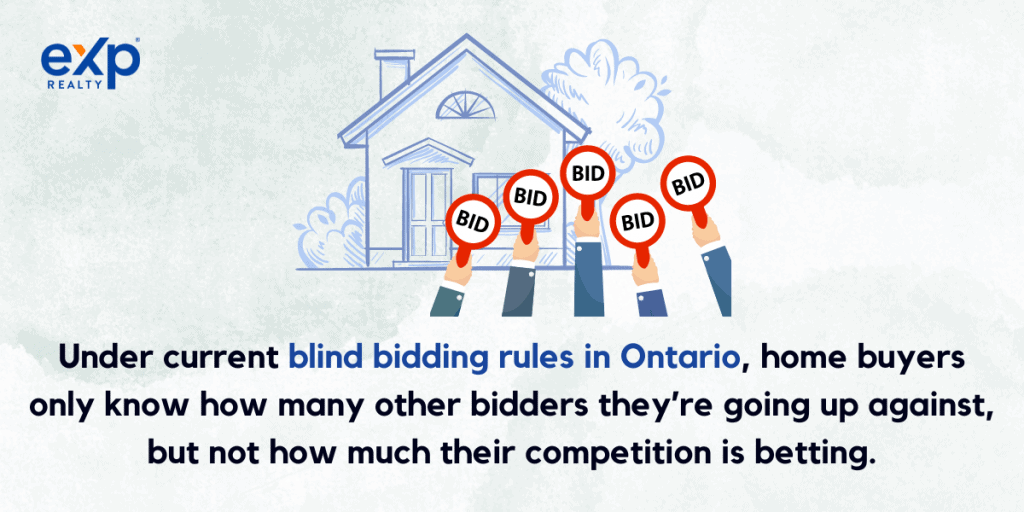Earlier this year, the Ontario Provincial Government introduced new regulations aimed at ending blind bidding wars. These regulations will take effect on April 1, 2023. Under the regulations, home sellers and their respective agents/brokers will have the choice of disclosing to buyers the substance of the bids made on their property, whereas before they had only to disclose the number of bids. In hot markets like Toronto Real Estate, the hope is that open bidding will create a fairer playing field and reduce home prices. Critics say that these new regulations are not addressing the main problem driving high prices: a lack of supply.
What is a Blind Bidding War in Ontario?
In hot markets like the Golden Horseshoe in Ontario, buyers are often not alone when bidding on homes for sale in Toronto. Usually, at least three other buyers are making bids and even more on more popular properties. Under current blind bidding rules in Ontario, home buyers only know how many other bidders they’re going up against, but not how much their competition is betting.
Imagine you’re playing a round of poker. You can see all the other players at the table, but in this case, you can’t tell how many chips they’re betting. In a blind bidding war, you have to make an educated guess at how much to bet and hope you beat out everyone else.
Sometimes the seller will come back to the higher bidders and give them the chance to make a second bid. Though this is not that common (usually bidding is a one-and-done deal), in exceptionally hot markets, this second round often results in homebuyers spending an extra hundred thousand on a home just to beat the other bids.
The new regulations, aimed at softening bidding wars in Ontario, hope to change that, but they come with a very big catch.
The Catch
Under these new regulations taking effect in April 2023, sellers will have the choice of transparency to bidders, not the obligation. These new regulations are, in effect, suggestions from the provincial government to the brokerages that represent sellers, suggestions that they increase transparency in the bidding process. With that in mind, let’s hear the arguments for and against ending blind bidding and what that will ultimately mean for home prices in Ontario.
Why Ending Blind Bidding Wars in Ontario Can Be Good
One major argument for getting rid of blind bidding wars in Ontario is that it will slow down the rate of price appreciation. Proponents of bid transparency say that, under the current system, where anxious buyers can’t tell what kind of bids they’re up against, buyers tend to shoot higher than they need to, thus spending more money than they need to and boosting home prices in higher than they should be.
If you boost the sale price of one home, you boost the price of all the homes around it. Proponents of bid transparency say that, if buyers could only see what they’re up against, they would make more rational, incremental increases in their bids, resulting in homes selling for closer to what they’re worth, though still over the asking price.
Proponents of ending blind bidding wars also argue that increased transparency would help create more trust and enthusiasm in the Canadian public for real estate in general and give buyers more power and control in a system they increasingly see rigged against them.
Why Ending Blind Bidding Wars in Ontario Can Be Bad
Critics of ending blind bidding wars in Ontario do not reject the benefits of bid transparency so much as they doubt whether transparency will actually solve the present issue at hand: the rapid rise of home prices in Ontario.
Critics maintain that current home prices are the result of an extreme lack of housing supply in Ontario, and not overbidding. Overbidding is a symptom of supply shortage, not the cause of it.
They also focus on the big catch in this new regulation: that sellers have the option to be transparent, not the obligation. They state that so long as sellers find it more profitable to have blind bidding wars, and they’re under no obligation to be transparent and thus make less of a profit, they will always choose to go the traditional route of a blind bidding war.
The Bottom Line: Will These New Regulations Lead To Lower Home prices?
These new regulations will probably not cause home prices to fall in Ontario. They may slow down the appreciation rate of those prices if indeed overbidding is driving them up. But the scarcity of houses in Ontario cities like Toronto and Mississauga, which are major centers of immigration and in-migration from Canada and abroad, will drive up prices just as reliably as overbidding, if not more so. Because these current regulations do not require sellers to make their bids transparent, they are not likely to succeed in the goal of lowering home prices and increasing trust in Canadian homebuyers. Before bidding on your dream house, be sure to research ways to win a real estate bid and hope for the best!















